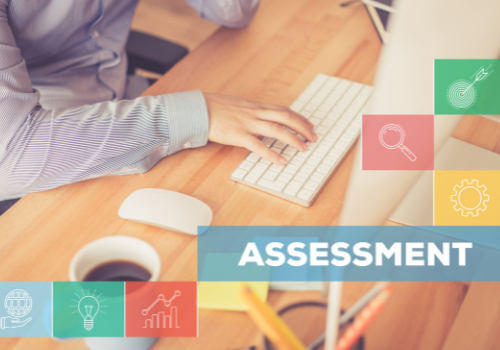Personal Assessments vs Aptitude Tests

Different paths on the journey to self-knowledge and enlightenment
We’ve all probably “wished we knew then, what we know now” at least a few times in our lives. Especially when it comes to decisions that, in hindsight, we might have approached differently had we had the benefit of insights into our skills, talents, abilities, aptitudes, and preferences.
Luckily, with the advancement of psychometric tools over the past 70-100 years, today’s students don’t have to depend completely on the “school of hard knocks” to gain the personal insight to navigate their complex world. But the question for most time-and-budget-challenged professionals is how to decide between a wide range of options. Hopefully, the rest of this blog will help.
Aptitude Tests
The classic aptitude test was first implemented by the U.S. government during the massive draft surrounding World War II. These abstract tests were used to determine innate aptitudes across a wide range of individuals rapidly, so they could be assigned roles where the military believed they would be effective. For example, individuals who were proficient in spatial relationships might be good navigators, or individuals with high reasoning proficiency might be good at clerical skills, etc.
As such, pure aptitude tests are largely prescriptive in nature and are good at fulfilling their original purpose. They engage abstract tests to define specific aptitudes the person may (or may not) be aware of, and then suggest careers where these aptitudes can be leveraged. The possibly misguided assumption is that if one leverages an innate aptitude they will be successful and find it satisfying. For example, an aptitude test might show a high proficiency with numbers and logic and suggest accounting as a career option, regardless if the individual might find it satisfying or a good fit for who they are and what they like.
Over the years, many professionals have become familiar with, and some proponents of, the prescriptive nature of aptitude tests as a counselling tool. While the tests themselves replicate a high-stakes environment with right and wrong answers, they do offer a straight-line connection between aptitude and a career path for the student to consider that’s appealing for some.
One factor that many professionals cite is the statistical reliability of these tests in identifying aptitudes. However, even psychologists agree that identifying aptitudes and applying them to career choices only goes so far. As one put it, “We might be pretty good at identifying aptitudes, but in a world where the student may have 6-7 careers, this insight only goes so far.”
Personal Assessments
An alternative view among many professionals is that the power of a personal assessment comes from the student’s discovery of their unique skills, talents, aptitudes, and preferences and learning how to employ this insight to important decisions around education and career paths.
Built on proven psychometric theory from pioneers like Carl Jung, Meyers-Briggs, Gardner and others, and validated through statistical analysis, these tools are built to enable the student to easily complete on their own schedule, using plain English terminology and a non-high stakes approach. Individuals can interpret the results largely by themselves and then validate and discuss their results with the professional who can offer additional valuable advice.
Often less expensive than aptitude tests in terms of time and money, and requiring little training or credentials on the part of the professional, personal assessments can provide valid insights into the student that can be used as the platform from which they can then explore careers and educational paths where people like them have found satisfaction and success.
While many professionals believe deeply in the efficacy of self-discovery and applying this insight throughout one’s life, others may not perceive they have the time to spend with the student to explore results.
5 Points to Keep in Mind
For help in deciding which approach, Aptitude Test or Personal Assessment, is right for your students, we offer the following five-point checklist:
- How important is a self interpretable report? Is understandable and actionable language in the assessment report important?
- How much time do you have with the student? Can the assessment be stopped and resumed or repeated as they develop? Can you get value in 20 minutes?
- How do the results relate to education decisions and paths? Consider the time required to translate results into educational plans - or does the assessment report do that for you?
- How comfortable are you with the methodology? Can you easily interpret and add value to the student's experience with the assessment(s)?
- How much value can you provide your student for the cost of the assessment? Is the assessment reasonably priced? Is there an opportunity for you to add value and enhance your business offering?
Both aptitude tests and personal assessments can provide guidance to students using professional, proven methodology aligned with psychometric theory. As in most things in life, there is no best answer, but there might be a better choice for your students’ needs.
.png?width=606&name=CPP%20%26%20AW%20Assessments%20Logo%20(1).png)
Try Personal Assessments
Through four unique personal assessments, the AchieveWorks® suite of assessments provides middle and high school students with a solid foundation of personal insight that will help them confidently leverage their strengths, plan an educational path, and set career goals in which they are most likely to find lifelong satisfaction and success. Purchase assessments from the student profile page within your CollegePlannerPro account.
Not a CollegePlannerPro Member? Not to worry. With our standalone assessments platform, consultants can purchase the suite of AchieveWorks® assessments without a full CollegePlannerPro subscription. Create a free standalone assessments account and purchase assessments for students.


